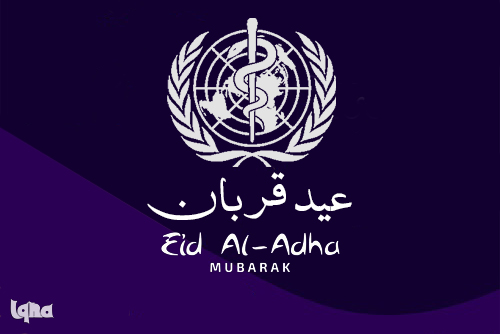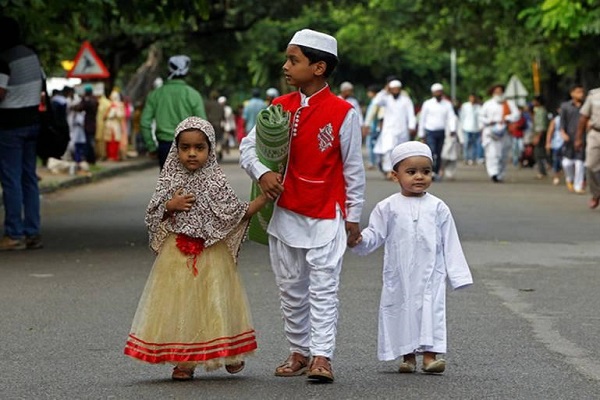WHO Issues Guidelines for Safe Celebration of Eid al Adha amid COVID-19

However, one thing that the pandemic couldn't take from the world is the spirit of Eid al Adha, a festival which unites not only about 1.8 billion Muslims around the world but also people of other faiths, as the universal spirit of sacrifice and charity rests at the very core of this otherwise religious festival.
To keep everyone safe in these troubled times and offer a glimmer of hope for a festival that is fighting in the face of COVID-19, the World Health Organization (WHO) has issued special guidelines for those celebrating this festival.
Guidelines titled "Safe Eid al Adha practices in the context of COVID-19" were released by the WHO on July 25 as "public health advice for social and religious practices and gatherings during Eid al Adha that can be applied across different national contexts."
First things first, the WHO stresses that "cancelling social and religious gatherings should be seriously considered," adding that "any decision to restrict, modify, postpone, cancel, or proceed with holding a mass gathering should be based on a standardized risk assessment exercise, taking into account current epidemiological trends, capacities, and resources."
However, if one is to proceed with social and religious gatherings and animal slaughter, there are a range of measures to be taken, surrounding prayer venues, dealing with livestock, slaughtering of animals and processing and distribution thereof.

Prayer venues
"Increased numbers of COVID-19 cases associated with and in parallel to Ramadan activities this year, particularly during family visits, congregate prayers and gatherings have been seen across countries in the Eastern Mediterranean Region," the WHO notes, cautioning countries to avoid such a situation.
Apart from observing social distancing and encouraging mask wearing at the venues, the WHO suggests holding the prayers outdoors, else ensuring that the indoor venue has adequate ventilation. In addition, shorter events with fewer people are encouraged instead of large gatherings.
Moreover, the WHO guidelines call for regulating the number and flow of people entering, attending and departing from worship spaces. At the same time, the authorities are advised to consider measures to facilitate contact tracing in the event that an ill person is identified among the attendees of the event.
Mosques usually have designated areas to perform ablution. Such washing facilities should be adequately equipped with soap and water, and alcohol-based hand-rub (at least 70 percent alcohol) should be provided at the entrance to and inside mosques.
As for the prayer halls, the WHO recommends worshipers bring their personal prayer mats to place over carpets.
Furthermore, authorities managing the mosques are advised to routinely clean and disinfect worship spaces, sites and buildings, and frequently clean often-touched objects such as doorknobs, light switches, and stair railings with detergents and disinfectant.
Sacrificial slaughter
Sacrificing a goat, camel or cow on Eid al Adha is considered obligatory for all those who can afford it. The festival sees a great number of makeshift cattle pens and enclosures around the world where people come to buy cattle. Such enclosures have the potential of becoming infection clusters since they are usually jam-packed with buyers and sellers, and of course a wide variety of cattle, with usually poor sanitary conditions, especially in underdeveloped and developing countries.
Buying cattle is one thing, and slaughtering it on the designated day is altogether a different can of worms. Most countries are now moving toward having designated slaughterhouses where people can take their sacrificial animal for slaughtering by expert butchers in relatively sanitary conditions. However, many still follow the convention of getting the deed done at their doorstep.
In this view, the WHO guidelines sternly advise countries to take strict measures around the selling and slaughtering of animals and the distribution of meat while ensuring that national food safety and hygiene regulations are enforced.
The guidelines call for enforcing proper procurement of animals, especially for importation of livestock, and refrain from slaughtering animals that appear sick, and plan for dedicated space for quarantine and isolation of suspected ill animals. At the same time, enough space ought to be allocated in dedicated enclosures to safely house an increased influx of animals and avoid unsanitary overcrowding.
Moreover, the WHO strongly discourages slaughter at home. Instead, the authorities are advised to increase the number or capacity of slaughter facilities to encourage best practices and ensure safety and physical distancing standards, for both public and staff.
Physical distancing, hand hygiene and proper cough etiquette are essential while processing animals and the staff should be aware of COVID-19 signs and symptoms, the guidelines stress.
Furthermore, waste management for unused animal by-products should be in place and facilities should have a contingency plan in the event of contamination or an outbreak.
Charity and gatherings
The battle is only half won once the sacrificial animal is brought to its holy demise, for now comes the moment of meat distribution and gatherings.
The WHO suggests that when people distribute meat, they should consider physical distancing measures, and it is better to nominate one household member to perform and order the sacrifice, preferably through centralized agencies or services.
Measures in some countries around the world
Meanwhile, various countries with substantial Muslim populations have announced special measures for Eid this year.
Pakistan, for instance, is bracing for a "smart lockdown" in its Punjab province and enforcement of special standard operating procedures (SOPs) around the country as it risks a spike in new cases after the upcoming Eid, which begins on Friday in the country.
Dr Zafar Mirza, a senior health adviser for Prime Minister Imran Khan, said on July 26 that people should not flock to animal markets and urged them to "buy sacrificial animals online to prevent a spike in new coronavirus cases."
According to Punjab Chief Secretary Jawwad Rafique Malik, there will be a ban on entry of elderly persons and children in the cattle markets, and special counters would be set up at entry points for screening of suspected COVID-19 patients. At the same time, law enforcement personnel will ensure foolproof security, social distancing and other precautionary measures for Eid prayer congregations.
As for the neighboring India and Bangladesh, reports suggest that most people are resorting to buying cattle online so as to prevent themselves from a possible exposure to the virus.
Meanwhile in India-administered Kashmir, reports talk of a relaxation in COVID-19 lockdown restrictions for three days from Tuesday to allow people to make purchases ahead of the Eid on Saturday. However, all mosques and shrines will remain closed for prayers.
In the Middle East, states are tightening anti-coronavirus precautions as cases spike: Iran on Monday reported 2,434 new COVID-19 cases while Saudi Arabia confirmed 1,993 new infections.
These are unprecedented times for Saudi Arabia where the annual pilgrimage Hajj is starting with just a thousand people rather than the usual two million as international travelers have been barred. The pilgrimage climaxes with animal sacrifice on Eid, which too is lackluster this year.
Oman has announced that a two-week curfew will be re-imposed in the sultanate from July 25 as case numbers continue to grow, while Iraq is imposing a full curfew for Eid.
Moreover, the Muslim Council of Britain (MCB) has been promoting outdoor prayers, saying ample time should be arranged between congregations and sermons. When it comes to Eid greetings, hugs or shaking hands should be avoided, and keeping family gatherings should be kept to a minimum and outdoors.
According to a media report, some mosques in Canada are following similar guidelines. Toronto's Jame Masjid is encouraging people to reserve a spot for prayer on its SMART Jamaat app.
For those who are unable to reserve a time, the Bosnian Islamic Association (BIA) in Toronto said Muslims can still perform Eid prayers at home instead, the report added.
While much of the world has implemented social distancing, Palestinians will be gathering with family and celebrating Eid as usual as there have been few cases.
Source: CGTN.com
 Most Commented
Most Commented 


